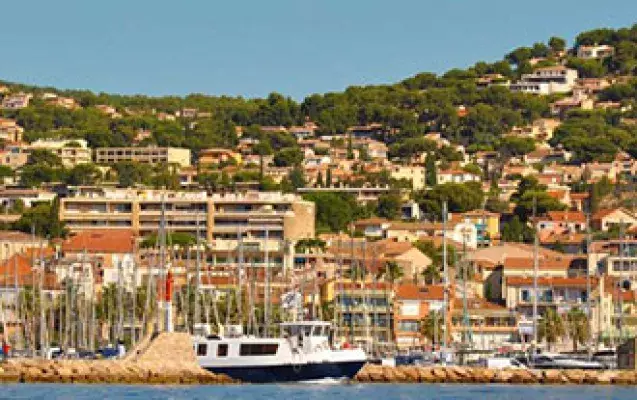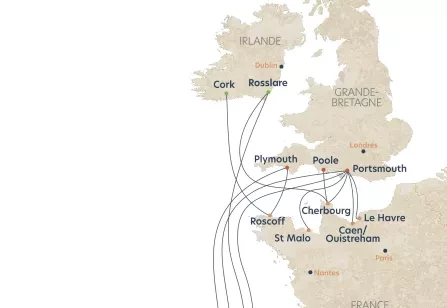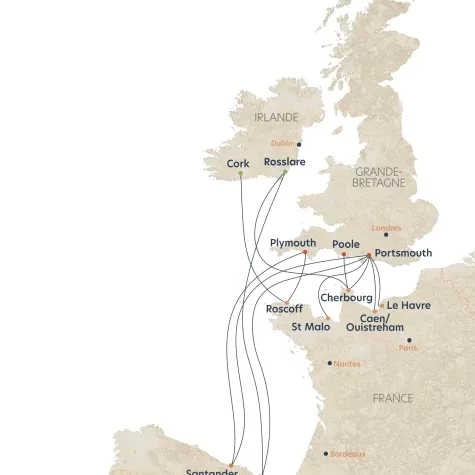


Travel to France
Although you can’t book travel directly with Siblu, getting to France is easy with lots of options from the UK. In this guide we’ve covered travel by ferry, the Euro Tunnel and flights, with suggestions of travel providers you can visit to find out more and book with directly.
Travelling by Le Shuttle (Eurotunnel)
One of the easiest ways to travel with your car to France is to take LeShuttle from Folkestone to Calais.
The crossing takes just 35 minutes, there are no luggage restrictions, and tickets include your vehicle and up to nine passengers making LeShuttle the cost-effective way to travel with your friends, family and even pets.
Check-in is simple, crossings run throughout the day through the Channel Tunnel, and you'll stay in your car for the duration of the journey, so you can stretch out, enjoy snacks and refreshments, and get set for your onward journey to France.
For more information and to book, visit leshuttle.com
While it is the perfect choice for reaching Dutch parks, it can also be a practical option for reaching some Northern French campsites. Most holidaymakers prefer to head west to parks in Normandy, the Loire, south of Paris or north into the Netherlands. The French Alps or the Languedoc area are also popular destinations for those venturing south from Calais.

SAVE 10% WITH BRITTANY FERRIES
Siblu customers can now save 10% on travel with Brittany Ferries. When you book your Siblu holiday, you will be emailed a code which you can use to claim your exclusive discount.
Travelling by Ferry
Ferry travel is a popular choice for holidaymakers who want the freedom of bringing their own car to France. The journey by ferry can be an exciting start to your holiday, especially for families. Many ferries come equipped with supervised play areas, cinemas, and children’s entertainers. Meanwhile, adults can enjoy the on-board shops, bars, and restaurants.
The main providers from the UK are P&O Ferries (poferries.com), for the short crossing from Dover to Calais, or Brittany Ferries (brittany-ferries.co.uk), which operates longer routes from Portsmouth, Poole and Plymouth direct to Brittany and Normandy, saving miles of driving. Brittany Ferries has everything from speedy crossings that can whisk you across the channel in as little as three hours, to overnight cruises in the the comfort of your own cabin with en-suite facilities.
As times and prices vary by the day, time and route you choose to travel, you'll need to check the ferry operator sites for latest prices.
Which ferry route should I choose?
Dover to Calais
If you want to bring your own car to France then ferry is a great choice for you, and there's no hard and fast rule about which is the best route for you.
The speediest and cheapest option is the P&O Ferries crossing from Dover to Calais, which takes around 90 minutes and costs from around £70 each way, depending on the time your travel.
Calais is on then north east coast of France, so you will face a long drive to reach holiday parks in Normandy, Brittany and along France's west coast, compared to a crossing that lands in Caen or Cherbourg.
However, if you're heading to the south coast, the drive from Calais is roughly the same distance as the ferry ports are Caen and Cherbourg, so the cheaper crossing cost is attractive.
Portsmouth & Plymouth to Caen, Cherbourg and Roscoff
Brittany Ferries routes across the Western Channel deliver you to France's north west coast, which can make a substantial difference to your drive time if your staying at a holiday park in Normandy, Brittany, the Vendee, Charente Maritime, or even Landes and Gastes in the south west.
As the crossing times are longer, these the option of hiring a cabin where you can relax, and the boats have shops, restaurants and entertainment including live shows and cinemas.
Ferries to France
Here's a summary of the key ferry crossings to France.
Dover to Calais
Operator: P&O Ferries
Crossing time: 1hr 15mins
Departures: Max. 23 a day
See the Dover to Calais timetable
Portsmouth to Caen
Operator: Brittany Ferries
Crossing time: around 6hrs (7hrs overnight)
See the Portsmouth to Caen timetable
Portsmouth to Cherbourg
Operator: Brittany Ferries
Crossing time: High-speed sailings from 3hrs, overnight crossings from 8hrs
See the Portsmouth to Cherbourg timetable
Portsmouth to St. Malo
Operator: Brittany Ferries
Crossing time: around 11hrs overnight
See the Portsmouth to St. Malo timetable
Portsmouth to Le Havre
Operator: Brittany Ferries
Crossing time: around 10hrs overnight
See the Portsmouth the Le Havre timetable
Plymouth to Roscoff
Operator: Brittany Ferries
Crossing time: 5h30 (11hrs overnight)
See the Plymouth to Roscoff timetable
Plymouth to St Malo
Operator: Brittany Ferries
Crossing time: around 4h30
See the Plymouth to St Malo timetable
Ferry ports to Siblu parks
To help you plan a route to your Siblu park, here's a guide to the travel times from every ferry port to every Siblu holiday park.
Travelling by Plane
France is also well-connected to the UK and other countries by air. Many major airports offer direct flights to France. Once you land, you'll find numerous parks within easy reach. This option is especially suited to holidaymakers who are not fond of long drives or water travel.
Useful Information for driving in France
Your holiday journey may well be the longest car ride of the year, so it’s good to know a bit about driving rules in France and it never hurts to get familiar with some of the French road signs.
Speed limits for cars
Motorways 80mph in dry weather or 68mph when wet, but on stretches of main road 55mph, and 49mph on the Paris ring road. Dual carriageways 68mph. Outside built-up areas 55mph. Towns and cities 31mph. Lower speed limits of 50mph outside built-up areas.
68mph on motorways apply in wet weather and to visiting motorists who have held a full driving licence for less than two years. In fog, 31mph when visibility is reduced to 55yards.
Motorway Information
To join a motorway follow the signs with the international motorway symbol or signs with 'par Autoroute'. Signs with 'péage' or 'par péage' lead to toll roads. Emergency telephones, which connect the caller to the police, are sited every 1.25 miles. Most motorways charge tolls, except for certain sections near large towns and cities.
Breakdowns in France
The use of a warning triangle or hazard warning lights is compulsory in the event of a breakdown or accident. It is also compulsory that you have a visibility vest available (normally fluorescent yellow) for each occupant in the vehicle. The vests should be stored in the vehicle, so if you do breakdown, you can put them on before getting out.
Accidents
Fire: tel. 18. Police: tel.17. Ambulance: tel. 15. Alternatively dial the European emergency call number 112 and request the service you require. If you are involved in an accident, you must complete a constat à l'amiable before the vehicle is moved. This represents the European Accident Statement Form and must be signed by the other party involved in the accident.
Documentation
A valid UK driving licence is acceptable in France. The minimum age for a driver is 18.
Other useful information
In hours of darkness/dusk you must drive on headlights; driving on sidelights only is not permitted. In fog, mist or poor visibility during the day, you must drive on either two fog lamps, or dipped headlights. Failure to comply with these regulations will lead to an on-the-spot fine.
In towns and cities, you must give way to traffic coming from the right - "priorité à droite", unless otherwise indicated. However, at roundabouts with signs bearing the words "Vous n'avez pas la priorité" or "Cédez le passage", traffic on the roundabout has priority. Where no such sign exists, traffic entering the roundabout has priority.
Outside built-up areas all main roads of any importance have right of way. This is indicated by a red bordered triangle showing a pointed black upward arrow with horizontal bar on a white background; or a yellow diamond within a white diamond, which is most commonly used.
Understanding road signs in France
ACCOTEMENT NON STABILISE - Soft verge
ALLUMEZ VOS PHARES - Switch on lights
CEDEZ LE PASSAGE - Give way
CHAUSSEE DEFORMEE - Uneven road surface
CHANTIER - Road works
FIN D'INTERDICTION DE STATIONNEMENT - End of parking restriction
ITINERAIRE BIS - Alternative route
PEAGE - Toll
POIDS LOURDS - Heavy vehicle route
PRIORITE A DROITE/GAUCHE - Priority to right/left
RAPPEL - Warning! (This literally means 'reminder', i.e. continue with the instruction given on the previous sign.)
ROUTE BARRE - Road closed
DOS D'ANE - Humpback
SENS INTERDIT - No entry
SENS UNIQUE - One way
SERREZ A DROITE/GAUCHE - Keep right/left
STATIONNEMENT INTERDIT - No parking
TOUTES DIRECTIONS - All directions
TRAVAUX - Road works
VIRAGES - Bends
CHEMIN SANS ISSUE - No through road
Latest Travel News : France
Make sure you're up to date with all the latest travel news before you plan or set out on your journey to France or the Netherlands.
Check the website of your ferry provider or your airline for all the latest updates on crossings and flights.
Information about Passports and Visas when Travelling to France and the Netherlands
Visas: Most tourists will not need a visa for their holiday. The exception is if you have spent 90 days in any 180-day period visiting countries in the EU's Schengen area. If this is the case, you will need to contact the French Embassy to apply for the correct visa (https://uk.ambafrance.org/-English)
Passports: must have a minimum of 6 months and no more than 10 years validity
Useful Links for Travelling to France and the Netherlands
Travel Health Advice for France
Travel Health Advice for the Netherlands
UK government advice about travel insurance
For the latest travel advice from the Foreign and Commonwealth Office click here
